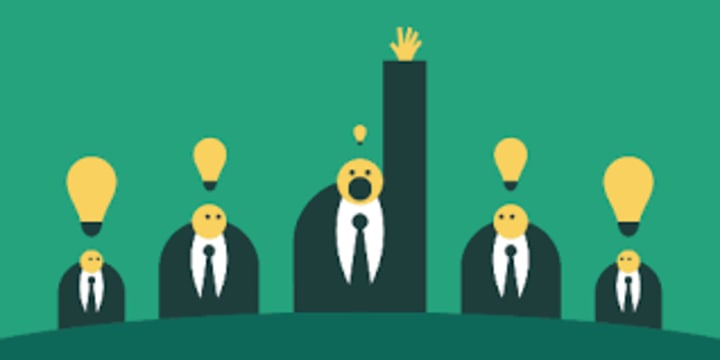The Freedom Paradox
An Insight Into Human Existence
In the words of Carl Gustav Jung:
“People don’t have ideas, ideas have people.”
How many ideas exist? Many to be sure but only one exists which possesses people in order to create an ultimate purpose therefore meaning and finally happiness: Freedom.
There are two ways to approach freedom, two polarities, two defining counter-opposites which place freedom at the axiomatic center of a paradox, one so mysterious and painful yet the only one by which we can strive for an infinitely far away paradise.
Freedom as the starting point and freedom as the goal.
We can take America, “the new world”, as an example of how an entirely cultural manifestation of freedom as the starting point was created by the incubation of the European old world, who’s perspective on achieving purpose has always been to fight for freedom, whatever freedom has ever been defined to be in its epochs (To free the soul during the dark ages of Roman Catholicism for example).
Freedom, if we define it to be what allows us to discover and live our lives the way we were meant to- has always been out of reach for the human race, until we came to the new world with the idea that we were free to build whatever is necessary to buy ourselves all the time we need in order to live free, only to discover the ironic truth about freedom itself: Free to do what?
For lack of an answer to this question, we became recursive with the mantra: Free to remain free- hence why we imprisoned ourselves with the one thing we were striving never to have to do: work. We can say that to be the quintessential hidden identity behind capitalism.
Europeans then, can be understood in their deeply conflicted hatred for America, as it stands on the other side of the puddle, seeing how the other perspective of freedom which they so strongly desire for themselves, is being taken to its absurd conclusion and proves that there is no way out of the paradox- and so to what can they turn? Back to the utopian idealism of the 20th century? Fighting for freedom as usual, by killing those who believe in freedom as a starting point? What a horribly absurdly absurd bind for a culture to find its self drowning in.
Ideas Shape

It should be remarked with fascination how an idea changes how people live, act and talk; Think of the stereotypical American- all Europeans recognize them the moment they open their mouths: they are belligerently loud, precisely because the idea has shaped them to be that way; America the free stipulates that you must be free to do what? To compete for freedom, and for that you must be loud, fast, strong of character and ruthless. This is a stark contrast to the subtlety and sophistication of the European, who’s perpetual fight for freedom demands people to be cooperative rather than competitive, in order to fight a common enemy- and such enemies are fascinatingly fractionated: The Italians with their historical warring city states, the Germans with their tribal kingdoms, the Spanish with their endless civil wars, the French with their wealth-class revolutions- Such turmoil gets very old for a freshly landed free man in the old world.
The irony to be seen from my perspective as a self-admitted misfit of misfits from Canada (a somewhat middle-ground between both worlds) is that many in Europe do not consciously realize that they think they can handle the problem better than we can in the west: Free to do what?
Such a paradox demands balance if anything to even understand it to be a paradox- I would so much have liked to call it a problem but decided against it by personal experience that it truly is paradoxical. I was arrogantly humbled into admitting that I would be the most arrogant to state that it is a problem, so as to imply that I would have the ability to find it’s solution: I can’t.
Returning to the question, my answer must be that we are free to find balance, what all wise men and have stated for so many years and so many wiser women have acted out. Therefore we are continuously shaped by either the ignorance of balance or the desire for it.
Practical Questions

All previous things being said, there is an obsession to be enjoyed in understanding the inner-workings of such a paradox; if we are free to find balance, where then does that point of balance between two boundaries lie? How far apart should those boundaries be? Surely it’s different for everyone and different over time for the individual.
Those questions are reserved for our inner selves and when applied we come to need their application to those around us: if I conclude that I must be free to travel the world, then I necessarily have to negotiate with my society to allow me to do it, or fight it if it won’t. We are walking engines of the freedom paradox, interacting with a complex multitude of freedom paradoxes across societal, psychological, physical and economic dimensions. One then has to wonder if those dimensions can be understood or superimposed to achieve some sense of higher-order which could allow for the maximally nurturing environment for the balancing of freedom.
This in itself creates a new question: Is balance just another fictional ideal? What if we peer into the future and imagine perfectly balanced societies, each with their perfectly balanced individuals- don’t we know this question to be useless anyway? One because it is not strictly possible, and two because even if it were, not desirable either.
Now we have come to the most stripped we can be of all weapons which guard against absurdity, and further still we can ask: Is that true? Are there not more questions which float out in the ether between us and the void?
I have just demonstrated how the practical questions we can ask in order to obtain a sense of balance with our freedoms can quickly devolve into something much worse than a counter-productivity.
Philosophical Conclusion

Circling back to the beginning, I chose a specific order in which to describe the process we experience and where freedom fits into it: Purpose, meaning and happiness.
We choose an ultimate purpose- I believe freedom is that ultimate purpose by which we establish two boundaries between which we find meaning, and if they are well set, such meaning can lead to happiness (we hope).
The boundaries are you (The starting point) and the freedom you have chosen is the endpoint (Either to discover yourself or fight for your ability to). That very mechanism is the ultimate purpose of freedom which we strive for, and yet it is a paradox because we have no way of defining anything in an absolute manner. You can define yourself through your struggle for freedom, and leave freedom undefined or you can define freedom to be the absence of struggle and then struggle to define who you really are…
Both options leave you with little meaning either in the short term or the long term, depending on which kind of freedom you have chosen for yourself; Struggle for freedom your entire life and you will find meaning in the short term but look back at a past devoid of meaning. Struggle for meaning of who you are your entire life and you will find meaning in a non-existent future while being tormented in every present moment. I do not know which is better nor which brings more happiness, only that it is a paradox.
We are entities possessed by ideas, being shaped and shaping ourselves and each other while suspended and imprisoned in the paradox of freedom, as we must choose between one of two polarities by which to strive for the point of balance- which, in the larger scale of infinitely regressive existence, does not exist.
I am not surprised by my extremism.
James Sirois
-This is what came out.
About the Creator
James Sirois
I am a writer, film maker and traveler.






Comments
There are no comments for this story
Be the first to respond and start the conversation.